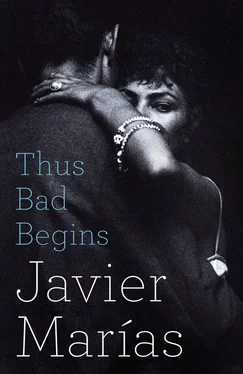And never having had that good fortune, not even as a young man, I decided to do something positive and half-calculated, but which would still act as a safeguard, something that would not dispel my doubts, but would at least diminish them. I offered her a cigarette, which, although she was a smoker, she declined. I lit my cigarette and, contrary to my usual habit — I always hold my cigarette in my left hand — I held it instead between the index and middle finger of my right hand and allowed my other hand, still holding my lighter, to fall on her thigh, which gleamed resplendent beneath the street lamps as they flashed past or beneath the intermittent moon. Not the palm, of course, that would have been cheeky, but the back of my hand. And not the whole of my hand either, but, initially, just the side or the edge, and then a little more, as if my hand were giving in of its own accord or being jolted into position by the occasional bumps in the road or by the driver when he accelerated through a green light. It seems absurd, a hand is just a hand, but there’s an enormous difference between the back and the palm of the hand, the palm is the part that feels and caresses and speaks, usually deliberately, while the back pretends and is silent.
She didn’t move her thigh, not a millimetre, she didn’t avoid or evade that new contact and she could easily have done so, there was room to her left; now it was flesh against flesh, still cautious, almost motionless, still wearing the mask of chance. I took the risk of moving the back of my hand very minimally during what remained of the journey, as though impelled by the slight swaying of the car when going round bends or corners or roundabouts, of which there are many all over Madrid. We didn’t speak. We didn’t speak. We didn’t speak. The longer you go without speaking, the harder it is to begin again, or so it seems, and yet all you have to do is open your mouth and utter one or two or three meaningful syllables: ‘Yes’ or ‘No’ or ‘What’ or ‘How’; or ‘Come here’ or ‘Go away’ or ‘More’ or ‘Nothing’. Or perhaps ‘Do you want’, and other words always follow. But neither of us said a word for the rest of the ride, we didn’t even have to give directions to the driver, as he knew where he was going now. When I finished my cigarette, I stubbed it out in the ashtray next to me, but my left hand remained where it was, still gripping the lighter as if it were a talisman or a relic, and this allowed me to keep the back of my hand resting on her leg, and with every minor swerve or lurch it gently caressed her thigh as if by chance. It met with no opposition, no rebuff, Celia didn’t seem bothered nor did she change her position. ‘And now what?’ I thought. ‘What will happen when we stop? Will we just go our separate ways, with a kiss on both cheeks? That would be the most natural thing, we’ve only walked a few blocks together, it’s just another minor nocturnal escapade — one of many — one that we probably won’t even remember. I’ll get out of the taxi first, so that she can get out the way she got in, it’s always dangerous to do so on the left-hand side, and it would be rude not to accompany her to her door, not after travelling all this way and with all these twists and turns, after which I have no idea where we are. Until she’s safe and sound, although she still wouldn’t necessarily be safe even then, I’ve heard of women being attacked in the lift, when they thought they were already safe, by men who’ve been waiting for hours, if they know a woman’s late-night habits, or who emerge out of the shadows and slip in behind her before the street door closes, and then she’s trapped when she’s so close to home, to her welcoming or woeful bed. Perhaps I should go upstairs with her, leave her outside her apartment door, play at being one of those almost non-existent gentlemen and thus get as close as I can to her sheets; absurd as it may seem, proximity facilitates and suggests, and can even tempt someone who had considered herself immune and had dismissed the possibility right from the start, but then suddenly changes her mind and succumbs to that feeblest and most decisive of arguments: ‘Why not?’ she says to herself. ‘I can always pretend it never happened.’
Calle Watteau was a short, narrow street, more of an affront to the French painter than an honour. I discovered with surprise that the road running parallel to it was called Juan de Vera, almost my name, or the one it should have been, and that seemed to me a sign and an incentive — who could he be? I wondered. The city council clearly thought him more important than Watteau at any rate, and about on a par with the Batalla de Belchite, of which Watteau was a side street. I knew none of them, but had suddenly, belatedly, recognized the area, and it occurred to me that the driver had taken us the long way round and that Celia had allowed him to or even led him to do so with her directions, so as to lengthen the journey and have more time to study me. We were a stone’s throw from the Paseo de las Delicias on one side and from the Museo del Ferrocarril on the other, and not very far from the river on another. Almost directly opposite where Celia lived was a women’s prison, or so the sign said, and a sad, chilling thought crossed my mind: what if she worked for the prison service, for the Ministry of the Interior? I looked at the walls and the high, dark windows. The inmates would have long since been in their beds, sleeping soundly, free from temptation, or only in dreams or, who knows, perhaps every night of those febrile years was the same to them. They would inevitably be aware of each other’s smell, a strong smell perhaps, I could smell Celia and she smelled sweet, even after the trek that had left us both slightly hot and out of breath and made her largish feet ache. The taxi stopped. I deliberately (I pretended not to notice, to forget) allowed the taxi driver to stop the meter, I pretended to protest.
‘Oh, you’ve stopped the meter,’ I said. I could have told him long before that I would be continuing on, but I hadn’t. He or another driver would have to take me home, that much was certain.
‘Well, since you didn’t say anything, I assumed … Shall I start the meter again or just work out a price for you?’
I didn’t need to respond or hesitate or ponder or shoot Celia an interrogative glance or pine palely away or put my expectations into words. I had the feeling that I’d been saved by the bell, as people used to say then, when there were still boxing matches and before they were frowned on.
‘Would you like to come up?’ Celia asked. She asked this quite naturally or, rather, with unequivocal certainty. It was a simple matter of going upstairs with her, not to have a drink or because we had got on so famously, nor so as not to interrupt the animated conversation we hadn’t had. Since she was, as I said, about ten years older than me, she would have seen straight through me from first to last, including now. Perhaps my false boast to Van Vechten had intrigued her, even though I had myself partly denied it immediately afterwards. There are lies and jokes that arouse our curiosity simply because we can never be absolutely sure what is a lie and what is a joke. And just in case there was any doubt as to whether her question was genuine, or that she had not meant it at all, but was merely being polite, or was testing me out, she repeated it, this time as a statement of fact: ‘Yes, you would like to come up. Come on, then, let’s go.’ I didn’t reply at once, I didn’t react. She smiled at me as one might smile at someone in shock. ‘Come on, what are you waiting for? Pay the man.’
She opened the door and got out on her side. That was the first time she had removed her thigh from mine, and I missed its warmth. I was still trying to work out if I would have enough money for a taxi later on or the following morning, the kind of anxieties and calculations that afflict the young, who are always short of funds. In the morning, I could get a bus or the metro, and besides what did it matter? At that age, you don’t care where you end up and are quite prepared to walk back home across the entire city, and will often find yourself marooned in some remote place in the early hours just on the off-chance or promise or possibility of getting a decent, memorable fuck, it’s that crude, that coarse; in the majority of cases this changes with time, after about thirty-five or thereabouts you become warier, lazier, you can no longer face the prospect of waking up in someone else’s bed and having to eat breakfast with an unappealing, unkempt, unpainted ghost, of getting undressed in the early hours, and, even though it isn’t strictly necessary, of becoming involved and establishing a link that the other person won’t forget, or not as instantly as you do. You also have a keener sense of loyalty towards the person waiting for you at home or away travelling or towards the woman’s unwitting or absent partner, whom perhaps you’ve never even met; you learn to put yourself in someone else’s shoes, even those of some imbecilic stranger (in the eyes of the lover, however fleeting or casual, almost all husbands appear imbecilic, just as all lovers are cretins in the imaginations of husbands, even if they don’t know who they are and aren’t even sure they exist). But none of this holds true when you’re twenty-three — on the contrary. It’s then that you’re most capable of deceiving, of playing tricks and using sophistry to persuade, of committing treacherous acts, pretending to be hard done by and even humiliating yourself in order to get what you want, of trying to arouse a woman’s pity, pretending to be tormented or ill, of lying to a woman and betraying a friend, of resorting to contemptible behaviour of which you will later feel ashamed, or which you will try not to recall so as to pretend it never happened and that the person who committed it is dead and buried: ‘That’s not me any more, he was just a child, and what children do doesn’t count. The real countdown begins today, or possibly tomorrow.’ You extend at will what you consider to be the age of irresponsibility.
Читать дальше












